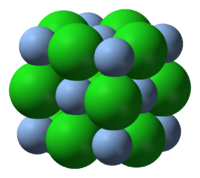
Photo from wikipedia
AbstractIn Egypt, the improvement in water quality of drainage water has become an important source of irrigation due to the depletion of freshwater resources, increase in population density, industrial activities,… Click to show full abstract
AbstractIn Egypt, the improvement in water quality of drainage water has become an important source of irrigation due to the depletion of freshwater resources, increase in population density, industrial activities, land reclamation projects and water stress linked to changes in climate conditions. This work aimed to improve the drainage water quality by using low-cost techniques such as chitosan–silver nanoparticles or immobilized microbial isolates, to use in various activities like irrigation and fish farming. Over a year period starting form January, 2016, synthesized chitosan–silver nanoparticle was characterized by transmission electron microscopy and Fourier-transform infrared and UV–visible spectrum. The bactericidal effect of chitosan–silver nanoparticles was achieved at a concentration of 2 g/l from 40 min to 3 h to remove total coliform, fecal coliform, Staphylococcus aureus, fecal streptococci and Pseudomonas aeruginosa from 198 × 105, 84 × 105, 16 × 103, 4 × 103 and 5 × 103 to zero CFU/ml−1, respectively, while uptake decreased with using immobilized microbial isolates to 38%, 76.1%, 64.6%, 64.4% and 54.7%, respectively. The removal efficiency of BOD, COD, TSS, turbidity and ammonia on chitosan–silver nanoparticles showed a sharp decrease of 89%, 80%, 81%, 90% and 93%, respectively; in contrary, the removal efficiency for immobilized microbial isolates was 38%, 76.1%, 64.6%, 64.4% and 54.7%, respectively. Finally, improvement in El-Gharbia drain water quality by chitosan–silver nanoparticles is higher than immobilized microbial isolates.
Journal Title: International Journal of Environmental Science and Technology
Year Published: 2019
Link to full text (if available)
Share on Social Media: Sign Up to like & get
recommendations!